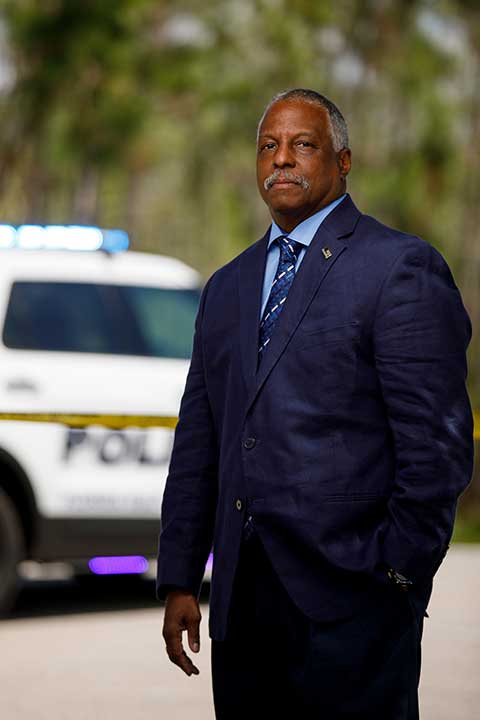The professor’s experience, combined with a Ph.D. in forensic psychology and his status as a licensed mental health counselor, makes him the go-to expert when the media examines why cops do what they do. But the death of George Floyd was not easily explained. A cop kept his knee on Floyd’s neck for 8 minutes and 46 seconds. Despite pleas for help and breath, Floyd died.
Four officers were fired and subsequently charged.
“I hope that law enforcement understands they have been arrogant about this issue,” said Thomas. “I am hoping that law enforcement recognizes it. Training needs to come out of this so we can make cultural changes to policing.”
The killing of George Floyd, the time it took for charges to be filed against the officers and a buildup of anger from similar incidents sparked protests around the country and the world.
“This generation, this group of kids, is now standing up and they are fighting. They have been mobilized,” Thomas said.
 As thousands of people protested the treatment of Black people by police, Thomas did what he could through the media. Since late May, he has been interviewed by reporters, producers and talk show hosts working for CNN, USA Today, the Voice of America and SiriusXM, among others. He was also interviewed by Minnesota Public Radio multiple times at the height of the protests.
As thousands of people protested the treatment of Black people by police, Thomas did what he could through the media. Since late May, he has been interviewed by reporters, producers and talk show hosts working for CNN, USA Today, the Voice of America and SiriusXM, among others. He was also interviewed by Minnesota Public Radio multiple times at the height of the protests.
“I have a particular expertise, and when I talk, the information is usually with balance. I can give you the cop perspective and I can also give you the Black person’s perspective. It’s a hybrid,” Thomas added.
While Thomas appreciates the opportunity to share his insight with a national audience, he has always been willing to support the local media in Southwest Florida. Recently, he’s discussed policing with NBC2, ABC7, Fox 4, WGCU, the News-Press and the Naples Daily News. WINK News also includes Thomas on a panel of four FGCU experts, including associate provost Tony Barringer, justice studies professor Pamella Seay, and Office of Institutional Equity and Compliance director Precious Gunter.
Everything Thomas discusses in the news becomes fodder for classroom discussion.
“I take every one of these incidents, and I put those incidents in the classroom,” he said. “This way the students have an opportunity to review and discuss it. I use the news in my class. Then I have my students do research on these topics to see how the information influences the public.”
Thomas’ 2019 book also uses real-world situations to illustrate the problems Americans face.
“These are tough issues: a failing history in policing, a culture that needs to change but refuses to, police decision making and race, implicit bias, police privilege and Black hysteria, militarization of police, and deadly force, all hot topics and relevant. I understand the feelings of the Black community, and I understand the cops are angry. The reality is, to continue to hate each other and not work together sets both sides up for failure,” Thomas said.
Heather Walsh-Haney, an FGCU professor who has garnered significant recognition for her work with law enforcement to locate and recover the dead, serves as the chair of the justice studies department. Walsh-Haney has experienced her own bursts of media attention on shows like HLN’s Nancy Grace and in publications such as National Geographic and Science. With that kind of experience, she recognizes the world’s need for Thomas’ expertise.
In a recent email to Thomas, Walsh-Haney wrote: “I write to tell you how proud I am to be your friend and colleague. Your work and experience will help move our nation. Thank you for giving your time to students, the department and me!”
One might think that high-level media appearances would mean more to Thomas, but notes from people who know and work with him, like the one from Walsh-Haney, mean a lot.
“This is the only way I know how to be,” said Thomas. “This is who I am all the time. I don’t necessarily have the best filters, but the information is there. This is Dave Thomas. You ask for an interview, and this is what you get.”[/vc_column_text][vc_column_text]
MEDIA MASTERS
Read previous stories in this series about FGCU’s most publicly known pundits:
- Robert Hawkes: Delivering reason, reassurance during a health crisis
- Pamella Seay: When media calls, ‘legal Eagle’ lays down the law